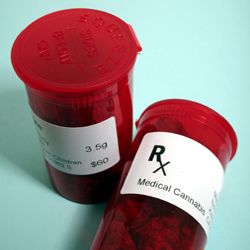
Publisher:
Bonnie King
CONTACT:
Newsroom@Salem-news.com
Advertising:
Adsales@Salem-news.com

~Truth~
~Justice~
~Peace~
TJP
Mar-10-2010 20:54

 TweetFollow @OregonNews
TweetFollow @OregonNews
Economic Benefits of Medical Marijuana Reform in Oregon
Ersun Warnke Salem-News.com Business/Economy ReporterComprehensive Marijuana reforms would increase revenues, create jobs, decrease law enforcement and incarceration expenditures, increase tourism, and create new educational opportunities in Oregon’s universities.
 Courtesy: treehugger.com |
(EUGENE, Ore.) - The existing medical marijuana program in Oregon has been highly successful, but is in many ways less than optimal. I am not personally a medical marijuana user, nor do I have any association with the organizers of the medical marijuana regulation campaign in Oregon. My opinions on these issues are my own, and should not be confused with the proposals of any of the other groups who advocate on these issues.
Medical Marijuana Law Reform

Marijuana is different than other widely used illegal drugs for a number of reasons. Unlike cocaine or methamphetamine, for instance, it has a wide range of legitimate medical uses; it is less prone to abuse, and it has comparatively negligible side effects.
Most importantly, Marijuana can be produced within the State. Marijuana is already produced extensively within the State, although under less than optimal growing conditions. The illegalization of Marijuana makes it impossible to openly sell locally produced Marijuana, and results in highly inefficient production methods.
Further Marijuana law reform is an immediate necessity. This reform should allow for licensed outdoor marijuana production by Oregon’s farmers; licensed production of manufactured goods including cannabinoid oils, hashih, and food products; licensed operation of businesses that sell these products; reform of the rules for obtaining medical marijuana permits; and steps to prevent the diversion of Oregon produced Marijuana into the illicit wholesale market.
The implementation of comprehensive Marijuana reforms would increase revenues for Oregon’s farmers, create new jobs, increase tax revenues for State and Local Governments, decrease expenditures for law enforcement and incarceration, increase tourism to the State, and create new educational opportunities in Oregon’s universities.
Marijuana for Oregon’s Farmers
Growing Marijuana indoors is highly inefficient. It requires excessive capital investment, and wastes enormous amounts of electricity. The additional cost of indoor growing renders the plants produced uncompetitive for use in value added manufactured products.

Allowing Oregon’s farmers to grow Marijuana outdoors would reduce the cost of production as well as the overall environmental impact of production, which is very high for indoor growing. It would also place Oregon production on a competitive basis with outdoor production elsewhere in the world, and lower the cost of production to a point where the manufacturing of value added secondary products would be profitable.
The strict regulation of licensed production is an absolute necessity for a variety of reasons. Legalization without regulation would almost certainly result in over- production. Over-production would result in a collapse in prices, mass diversion to illicit wholesale markets, and a subsequent lowering of production standards and quality in order to compensate for lower revenues.
A regulatory regime for legal marijuana production must set reasonable production quotas necessary to maintain stable prices. A method for assigning quotas to farmers based on a desire to participate and other factors must be arrived at. Strict quality standards and production guidelines must be created, enforced, and adhered to.
Value Added Manufactured Products
 Courtesy: hempsteads.com |
Demand exists for high quality cannabinoid oil, hashish, and food products manufactured from Marijuana plants.
Allowing for regulated outdoor farming of Marijuana would lower the prices for raw materials sufficiently to make small scale manufacturing of value added products profitable at prices low enough to insure sufficient effective demand.
Use of raw Marijuana plant material for manufacturing would also serve to utilize available production capacity and discourage diversion of production into illicit wholesale markets.
Small scale manufacturing of Marijuana based products would be a new source of employment for Oregonians.
The number of jobs created would not be very large, but they would require and develop specialized skills in employees. As a result, these new jobs would result in living wages that would remain steady over time.
Licensed Marijuana Dispensaries
The sale of Marijuana and Marijuana products from licensed production and manufacturing requires licensed retail distribution. Both new and existing businesses should be allowed to apply for retail licenses.
 Courtesy: chattahbox.com |
Rules for the division of licensing between State and local authorities must be determined in a way that is suitable for all parties.
The State has a strong interest in maintaining the integrity of the retail licensing program over all. Localities have a strong interest in setting their own rules for what types of businesses they want operating in their communities. It would probably be reasonable for local city governments to have the right to issue or refuse to issue a license to any business within their jurisdiction. If a city approved a license, then that license would be submitted to the State, which would have final authority over approval or rejection.
Since prices for retail products will be essentially fixed, the State has an interest in limiting the number of retailers involved in distribution and preventing them from competing on price. Excessive competition will result in declining revenues and create incentives for diversion into illicit wholesale markets and other unsound business practices.
Licensing for retailers should take into account community support, a demonstrated record of business experience, a demonstrated record of moral and ethical conduct, and the type of business requesting the license. Businesses that have a commitment to providing a safe, open, and inclusive environment for medical marijuana users should receive the highest priority in licensing decisions.
Medical Marijuana User Permit Reform
The current system for issuing Medical Marijuana permits is insufficient in a number of ways. It makes demands on patients that many find unreasonable, and as a result limits the use of the program. Expanding access to the Medical Marijuana program is necessary.
The primary obstacle to patient access to Medical Marijuana is cost. The requirement of a Doctor’s referral and the yearly fee for licensing create significant and unbearable costs for patients, especially among Oregon’s low income and uninsured populations.
 |
The requirement of a Doctor’s referral is also problematic because of the limited amount of scholarly research into Medicinal Marijuana, and the ongoing classification of Marijuana as a Schedule I substance with no legitimate medical purposes. Many doctors are in a position of not being able to refer patients for Medical Marijuana, simply because the scholarly research that would allow them to make that referral within the normal operating guidelines of their profession does not exists, or is not well established enough to be conclusive.
In light of the high costs of obtaining a doctor’s referral and the difficulty for some doctors of giving such a referral based on the paucity of academic research on the subject it, is necessary to make the doctor’s referral an optional element in obtaining a Medical Marijuana permit.
Along with making a doctor’s referral optional, the cost of Medical Marijuana permits should be lowered. One option would be to allow for a shorter term permit, such as for one month, at a correspondingly lower cost. It is unreasonable to charge patients for a one year permit before they have even tried a medicine, which they may discontinue the use of after only a few weeks, if they find it to be inefficacious. A similar up-front permit cost exists for no other medication, and is prejudicial to the use of Medical Marijuana. Finally, Medical Marijuana permits should be provisionally effective from the time of application. Licensed Medical Marijuana retailers should be allowed to accept applications, and if they certify that they are complete and have verified the identity and age of the applicant, a provisional permit should be issued on the spot. This would expedite the application process and reduce the overhead costs of processing applications for the State.
Preventing Diversion of Medical Marijuana into Illicit Wholesale Markets
Preventing the diversion of Medical Marijuana grown in Oregon into illicit wholesale markets is a necessity of operating an effective program. Oregon’s freedom to set its own laws in this area is limited by the potential impact of Oregon’s laws on other States and Countries. If Oregon were to become a major source of wholesale Marijuana flowing to other States, this would almost certainly result in negative repercussions.

The best way to limit diversion is through tight control of production quotas and maintenance of consistent retail prices for end user products. The purpose of licensing every aspect of production and distribution, from the field to the end user, is to fairly distribute profits amongst all parties. In the end, retail prices for consumers need to be competitive with illicit retail prices, but no person in the licensed distribution chain should have any incentive to compete with illicit wholesalers.
Maintaining retail prices at current illicit levels, even as the costs of production are decreased and the quantity of production is increased, requires adding value to the licensed product through increased quality, regularity, and variety of product. Diversion of significant amounts of production into manufacturing of value added secondary products is an important element of this strategy. Production of licensed plant product for retail sale should adhere to strict guidelines requiring organic production techniques. Product for retail sale should be visually inspected and graded, as well as tested and graded for cannabinoid content. Only the highest grade plant materials should be allowed into the retail supply chain, with the rest being restricted to manufacturing use.
Unique packaging for all retail plant product should be created, and required to be used for all licensed product sales. This packaging should be designed to prevent damage and degradation of the product in transportation and storage to the greatest extent possible. Labeling for all retail plant product should be consistent and uniform, and clearly state the essential information necessary for retail customers to make informed decisions about their medicinal purchases.
All retail product should be marked with a seal indicating that it is licensed product. In addition, every unit should have a unique serial number applied to it. The serial number of each unit should be of the “scratch off” form, which would prevent seeing the serial number without defacing the label. A system for verification of serial numbers should be put in place, which would allow a retail buyer to scratch off the label, then verify the serial number via phone or internet. The combination of a uniform seal and unique serial number would provide the best possible guarantee of quality and authenticity for licensed retail product being sold for medical purposes.
Economic Benefits of Marijuana Reform in Oregon
 Photo by Dexter Phoenix Salem-News.com |
Broad reform of Marijuana laws would result in major economic benefits to the entire State. These benefits would flow to farmers, medical marijuana patients, the State government, local municipalities, job seekers, and even law enforcement.
Farmers would benefit dramatically from the availability of a new cash crop. The shift in Oregon Marijuana production from indoor to outdoor growing would make production more efficient and result in increased production. This in turn would increase the share of local production vis-à-vis foreign production in local consumption, resulting in more money staying in the State.
A shift to local production would decrease the illegal importation of illegally produced Marijuana, reducing crime by reducing the potential for criminal organizations to profit. This would allow for the reallocation of law enforcement resources to other priorities, while decreasing non-drug criminal activity that arises from drug related organized crime.
Growing marijuana legally and openly does potentially create a target for thieves and other criminals. Local law enforcement agencies would play an important role in securing marijuana grow sites, and preventing the theft and diversion of Marijuana crops. Enforcing laws against the illegal importation of illegally grown foreign Marijuana would remain a law enforcement priority at its same current level.
Medical marijuana patients would greatly benefit from licensed and regulated production that would guarantee them consistent access to a wide variety of uniformly high quality product at competitive prices. Lowering barriers to entry for obtaining medical marijuana permits would dramatically increase participation in the program.
 Photo by Dexter Phoenix Salem-News.com |
State revenues from permit fees would likely increase by several times over. The increase in State income tax revenue from licensed producers, manufacturers, and retailers would be an order of magnitude greater at least. This increase in revenues would accompany decreasing costs for law enforcement, incarceration, and health care.
The creation of a comprehensive program for producing, distributing, and retailing medical marijuana would make Oregon, and especially Portland, a major destination for medical tourism. Medical Marijuana user permit reform would make it possible for patients seeking care to visit Oregon and immediately obtain a temporary permit at a reasonable cost. Medical tourism could be a major source of additional revenue for all of the businesses in a community. As Portland would be the most likely destination for out-of-State patients, the City of Portland and its businesses would receive increasing revenues over time from Medical Marijuana reform.
Shifting Marijuana production to farms and creating new business opportunities in the manufacturing of Marijuana related products would create new jobs available to all Oregonians, and especially Oregonians in rural areas. These rural areas currently have the highest unemployment rates in the State. Reform of Medical Marijuana laws would immediately create new private sector jobs without any Government spending.
Comprehensive Medical Marijuana reform would also create new opportunities for research and education into Marijuana that could be beneficial for Oregon universities. Oregon State University would be a natural fit for new research and education programs related to Marijuana production. The University of Oregon and Oregon Health Sciences University would be naturally suited to running programs that focused on the medicinal uses of Marijuana as well as other related subjects. Legal reform would make Oregon universities leaders in this field of research.
Conclusion
Marijuana Prohibition is coming to an end. Currently, Oregon is obligated by Federal Law to stay within the framework of Medical Marijuana, but within that framework, Oregon should be a leader and an innovator.
Comprehensive reform of Medical Marijuana laws, as outlined here, would result in a domestic industry with gross revenues on the order of hundreds of millions of dollars per year. This revenue would be spread broadly across many sectors of the Oregon economy, and flow proportionately to both rural and urban areas.
Medical Marijuana reform would benefit all. The only real losers would be international drug cartels, and their illegal drug distribution networks. The legislature and the voters of this State should make this reform one of their top priorities.
 Salem-News.com Business/Economy Reporter Ersun Warncke is a native Oregonian. He has a degree in Economics from Portland State University and studied Law at University of Oregon. At a young age, his career spans a wide variety of fields, from fast food, to union labor, to computer programming. He has published works concerning economics, business, government, and media on blogs for several years. He currently works as an independent software designer specializing in web based applications, open source software, and peer-to-peer (P2P) applications.
Salem-News.com Business/Economy Reporter Ersun Warncke is a native Oregonian. He has a degree in Economics from Portland State University and studied Law at University of Oregon. At a young age, his career spans a wide variety of fields, from fast food, to union labor, to computer programming. He has published works concerning economics, business, government, and media on blogs for several years. He currently works as an independent software designer specializing in web based applications, open source software, and peer-to-peer (P2P) applications.
Ersun describes his writing as being "in the language of the boardroom from the perspective of the shop floor." He adds that "he has no education in journalism other than reading Hunter S. Thompson." But along with life comes the real experience that indeed creates quality writers. Right now, every detail that can help the general public get ahead in life financially, is of paramount importance.
You can write to Ersun at: warncke@comcast.net
Articles for March 9, 2010 | Articles for March 10, 2010 | Articles for March 11, 2010

Quick Links
DINING
Willamette UniversityGoudy Commons Cafe
Dine on the Queen
Willamette Queen Sternwheeler
MUST SEE SALEM
Oregon Capitol ToursCapitol History Gateway
Willamette River Ride
Willamette Queen Sternwheeler
Historic Home Tours:
Deepwood Museum
The Bush House
Gaiety Hollow Garden
AUCTIONS - APPRAISALS
Auction Masters & AppraisalsCONSTRUCTION SERVICES
Roofing and ContractingSheridan, Ore.
ONLINE SHOPPING
Special Occasion DressesAdvertise with Salem-News
Contact:AdSales@Salem-News.com
googlec507860f6901db00.html



Terms of Service | Privacy Policy
All comments and messages are approved by people and self promotional links or unacceptable comments are denied.
marijuana outdoors May 9, 2010 10:21 am (Pacific time)
The article is good. Unlike other prohibited drugs, marijuana on the other hand can be used in medical purposes. By doing these follow it up with seminars that will educate people to use the plant properly with out risking their health.
Jeff Kaye~ March 11, 2010 3:49 pm (Pacific time)
Wonderful article, Ersun. But I think you should've just called it "Benefits of Marijuana Law Reform", as the benefits go so much farther than economic (and Oregon), as you pointed out here; ecological benefits are a great plus to bringing cannabis back onboard as a crop... Hemp is good for the soil, requires very little fertilizer or pesticides and cleans the air. Loggers can switch to "hempers", thus saving our wonderful, yet dwindling forests full of (okay not so full anymore) air purifying trees. I believe it would create a great many "green" jobs, and once you guys show us how it's done in Oregon, the rest of the states will be clamoring for their share of the enormous windfall of profit and benefits to the environment, savings on law enforcement via fewer arrests and incarcerations of people innocent of any real crime. I would be remiss if I didn't point out Madeline Martinez' and Paul Stanford's, et al, contributions toward this worthy cause. Thank you for bringing this issue out for the readers. The world is watching, waiting to see which state will be the first to actually do it; legalize the adult use of a perfectly safe social relaxant which also happens to help with a myriad of illnesses. Personally (no bets) I'm hoping for a three-way tie across the Western seaboard. That would be ideal. One of the strongest selling points of RE-legalization is that it's non-toxic, not really habit-forming and produces "NO HANGOVER!" Also, once it is properly regulated and controlled, much like alcohol, our kids won't find it easier to get than beer, booze or cigarettes. Prohibitionists no longer have a leg to stand on... all their BS reasons for keeping this amazing plant illegal have been debunked. Those studies recently released in California clearly show the medical efficacy and relative harmless nature of this herbal gift from God (the God of your choice). I'm agnostic, meaning I have an open mind, and I'm particularly open to advancing studies on the close to 70 cannabinoids contained in this plant, most of which we know very little about. The pharmaceutical potential is huge. And that's not even taking into consideration the literally thousands of uses for the plant's non-psychoactive, usually taller and reedier version, hemp. This one plant can sustain our whole society, producing oil for fuel and healthy cooking from its seeds, and building materials superior to steel in their tensile strength-to-weight ratio. Haiti would've had very litttle damage and very few deaths, were "hempcrete" used in place of the heavy, yet fragile cement and concrete monstrosities of buildings still going up in that country. There is literally not enough room (or time) here to enumerate cannabis/hemp's seemingly infinite beneficial uses, so let me just say "Everyone who can read, should buy, borrow or otherwise acquire, the Bible for info on this plant's history, uses and prohibition: Jack Herer's book, The Emperor Wears No Clothes." And if you want to know how to grow, Jorge Cervantes' books are unsurpassed in their Cannacultural wisdom. Another odd, yet potentially useful tidbit on cannabis/hemp, or as the government refers to it "Marijuana": I don't recall hearing about anyone, anywhere, ever, being allergic to it. If anyone has such an allergy, I'd like to hear from them. Otherwise, that's just one more reason it is superior medicine. Not too many man-made drugs can boast the claim that no one is allergic to them. Much research is needed -- any volunteers?
Bruce Cain March 11, 2010 10:56 am (Pacific time)
What about untaxed, unregulated self cultivation http://www.newagecitizen.com/MERP.htm?
TheWeedBlog March 11, 2010 8:48 am (Pacific time)
I don't think legalization and taxation are nearly as easy as people think. Because it is in the news a lot lately, people act like the 'war on marijuana' will be over anyday, so just sit back and relax. The truth is, the fight is just heating up. Only 13 states have decriminalized marijuana possession, and when you really look into it, even some of those 13 haven't REALLY decriminalized, they just took away jail time. I don't think taxing marijuana will generate the type of revenue that people expect. However, the money that will be saved by not eradicating/prosecuting marijuana is still a staggering figure, and well worth the fight. Johnny Green www.theweedblog.com
malcolm kyle March 11, 2010 6:14 am (Pacific time)
Prohibition is a sickening horror and the ocean of human wreckage it has left in its wake is almost endless. Based on the unalterable proviso that drug use is essentially an unstoppable and ongoing human behavior which has been with us since the dawn of time, any serious reading on the subject of past attempts at any form of drug prohibition would point most normal thinking people in the direction of sensible regulation. By its very nature prohibition cannot fail but create a vast increase in criminal activity, and rather than preventing society from descending into anarchy, it actually fosters an anarchic business model - the international Drug Trade. Any decisions concerning quality, quantity, distribution and availability are then left in the hands of unregulated, anonymous, ruthless drug dealers, who are interested only in the huge profits involved. Prohibition ideology is based on lies and the 'War on Drugs' is a de facto 'war on people' (some might even successfully argue that it's a de facto race war). Prohibition has decimated generations and criminalized millions for a behavior which is entwined in human existence, and for what other purpose than to uphold the defunct and corrupt thinking of a minority of misguided, self-righteous Neo-Puritans and degenerate demagogues who wish nothing but unadulterated destruction on the rest of us!
[Return to Top]©2026 Salem-News.com. All opinions expressed in this article are those of the author and do not necessarily reflect those of Salem-News.com.